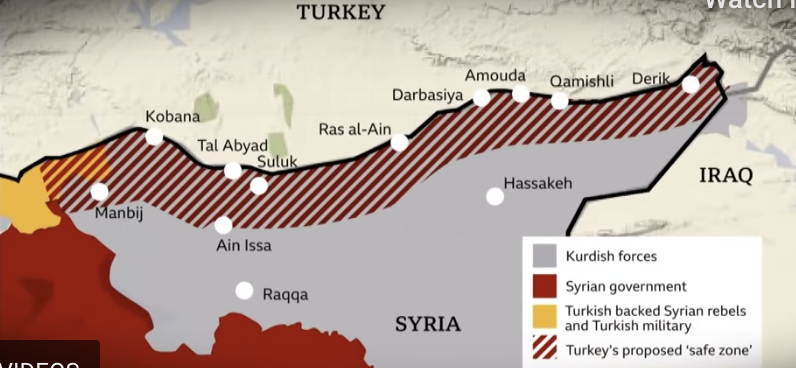

From the George Washington University Columbian College of Arts & Sciences: History News Network
10/20/19
The Greatest Danger in the Kurdish Crisis
News Abroad
tags: Middle East, foreign policy, Syria, Turkey, diplomatic history, Kurds, Trump
by Zaman Stanizai
Zaman Stanizai, Ph.D., is a professor of Political Science at California State University, Dominguez Hills.
The greatest danger in the Kurdish crisis is not in the tremendous loss of life, as tragic and shameful as that may be. In a volatile region of the world that is part and parcel of an on-going tragedy. It isn’t in the fact that Kurds are repeatedly being used by one neighboring country against another as a convenient self-sustaining guerrilla force. The world community has been numbed to that. It is not in the U.S. betrayal of their cause either. That has been done seven times before. The greatest tragedy in the Kurdish crisis is in Turkey’s attempt to literally break up an otherwise contiguous Kurdistan straddling Turkey, Iran, Iraq, and Syria into Bantustans à la Israel and South Africa.
If the heavy-handedness of the Turkish military is any indication, Erdogan seems to be bent on the ethnic cleansing and relocation of Kurds in northern Syria and resettling their lands along the Turkish border with Arab Syrian refugees currently residing in Turkey.
In this clash of cultures, the encroachment on Kurdish lands in northern Syria through an Arabization of the settlements amounts to an outright ethnic cleansing. If left unchecked, it will most likely be repeated on the Iraqi side of the Turkey-Iraq border in due course.
In the larger scheme of things, the Iranian Kurds will be left at the mercy of Persian chauvinism and Kurds in Turkey will be conveniently rebranded as ‘mountain Turks,’ eliminating any chance for the 35 to 40 million Kurds to ever have a nation-state of their own as the ground would’ve literally shifted.
There was hope in the early years of the Erdogan administration that the Turkish government could show a human face towards the Kurds. When Fethullah Gülen’s grassroots Hizmet movement energized the Adalet ve Kalkınma Partisi (AKP) or the Justice and Development Party to a victory, Hizmet’s advocacy of the principles of inclusivity without coercion became the cornerstone of Erdogan’s administration. Restrictions on Kurdish cultural expressions that have been imposed since the times of Atatürk were lax. But since the fall out between Hizmet and AKP in 2013, not only have the humanistic aspects of the AKP administration been replaced by a more dogmatic attitude in matters of religion, but Erdogan’s liberal stance towards the Kurds has also turned into an authoritarian one.
With Turkey’s economic slowdown and the increasing challenge from the Kemalist center-left evidenced by their recent victory in Istanbul’s mayoral election, Erdogan’s incursion into Syria is as much a diversion tactic as it is a grandstanding to Turkish nationalism. Erdogan probably believes that the crushing of the Kurds will also take the wind from the sails of Kemalists super-nationalists.
Erdogan’s calculated risk may pay off in terms of Turkish politics, but in terms of the politics of the Muslim world, his popularity sinks very low— considerably low. Erdogan who once stood out as the last beacon of hope for progressive Muslims who witnessed Islam’s compatibility with modernity, progressive democracy, and economic development is no longer so. Erdogan’s policies now seem to be inline more with those of the Chinese ethnic cleansing and cultural indoctrination of the Uighurs in Xinjiang, Modi’s Indian incursion into Kashmir, Netanyahu’s aggressive Jewish settlement in Palestine, Putin’s suppressive incursion into Chechnya, and a number of other right-wing nationalist / fascist rulers who have occupied the world political stage as of late. Even in military terms, Turkey’s bloody incursions into the land of Syrian Kurds approximate those of the Saudis in Yemen.
Retracting the earlier ‘green light’ statement by the White House followed by threats of economic sanctions against Turkey brings to mind the baiting of Saddam who was lured into invading his southern neighbor Kuwait in 1990. As intriguing as that analogy sounds, this scenario may not play out quite the same for the following reasons:
- Weapon sales to Turkey would be too lucrative for the arms dealers to ignore. They would most likely find enough loopholes in the economic sanctions to get around it. The Kurds don’t tilt the scales for any Western power in this regard.
- Domestically, with the Gülen movement out of the equation, Erdogan has no choice but to dress his religious dogmatism in a nationalist mantle.
- Most importantly, Erdogan’s trump card is Turkey’s military prowess as a NATO member that makes Turkey invulnerable, invincible, and indispensable.